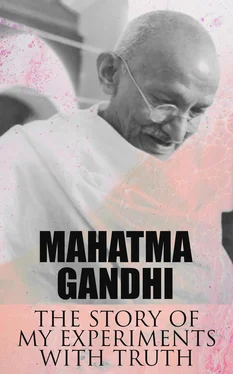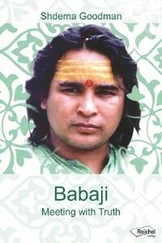Mahatma Gandhi - The Story of My Experiments with Truth
Здесь есть возможность читать онлайн «Mahatma Gandhi - The Story of My Experiments with Truth» — ознакомительный отрывок электронной книги совершенно бесплатно, а после прочтения отрывка купить полную версию. В некоторых случаях можно слушать аудио, скачать через торрент в формате fb2 и присутствует краткое содержание. Жанр: unrecognised, на английском языке. Описание произведения, (предисловие) а так же отзывы посетителей доступны на портале библиотеки ЛибКат.
- Название:The Story of My Experiments with Truth
- Автор:
- Жанр:
- Год:неизвестен
- ISBN:нет данных
- Рейтинг книги:5 / 5. Голосов: 1
-
Избранное:Добавить в избранное
- Отзывы:
-
Ваша оценка:
- 100
- 1
- 2
- 3
- 4
- 5
The Story of My Experiments with Truth: краткое содержание, описание и аннотация
Предлагаем к чтению аннотацию, описание, краткое содержание или предисловие (зависит от того, что написал сам автор книги «The Story of My Experiments with Truth»). Если вы не нашли необходимую информацию о книге — напишите в комментариях, мы постараемся отыскать её.
The Story of My Experiments with Truth — читать онлайн ознакомительный отрывок
Ниже представлен текст книги, разбитый по страницам. Система сохранения места последней прочитанной страницы, позволяет с удобством читать онлайн бесплатно книгу «The Story of My Experiments with Truth», без необходимости каждый раз заново искать на чём Вы остановились. Поставьте закладку, и сможете в любой момент перейти на страницу, на которой закончили чтение.
Интервал:
Закладка:
Let not the reader think, however, that ours was a life of unrelieved bitterness. For my severities were all based on love. I wanted to make my wife an ideal wife. My ambition was to make her live a pure life, learn what I learnt, and identify her life and thought with mine.
I do not know whether Kasturbai had any such ambition. She was illiterate. By nature she was simple, independent, persevering and, with me at least, reticent. She was not impatient of her ignorance and I do not recollect my studies having ever spurred her to go in for a similar adventure. I fancy, therefore, that my ambition was all one-sided. My passion was entirely centred on one woman, and I wanted it to be reciprocated. But even if there were no reciprocity, it could not be all unrelieved misery because there was active love on one side at least.
I must say I was passionately fond of her. Even at school I used to think of her, and the thought of nightfall and our subsequent meeting was ever haunting me. Separation was unbearable. I used to keep her awake till late in the night with my idle talk. If with this devouring passion there had not been in me a burning attachment to duty, I should either have fallen a prey to disease and premature death, or have sunk into a burdensome existence. But the appointed tasks had to be gone through every morning, and lying to anyone was out of the question. It was this last thing that saved me from many a pitfall.
I have already said that Kasturbai was illiterate. I was very anxious to teach her, but lustful love left me no time. For one thing the teaching had to be done against her will, and that too at night. I dared not meet her in the presence of the elders, much less talk to her. Kathiawad had then, and to a certain extent has even today, its own peculiar, useless and barbarous Purdah. Circumstances were thus unfavourable. I must therefore confess that most of my efforts to instruct Kasturbai in our youth were unsuccessful. And when I awoke from the sleep of lust, I had already launched forth into public life, which did not leave me much spare time. I failed likewise to instruct her through private tutors. As a result Kasturbai can now with difficulty write simple letters and understand simple Gujarati. I am sure that, had my love for her been absolutely untainted with lust, she would be a learned lady today; for I could then have conquered her dislike for studies. I know that nothing is impossible for pure love.
I have mentioned one circumstance that more or less saved me from the disasters of lustful love. There is another worth noting. Numerous examples have convinced me that God ultimately saves him whose motive is pure. Along with the cruel custom of child marriages, Hindu society has another custom which to a certain extent diminishes the evils of the former. Parents do not allow young couples to stay together long. The child-wife spends more than half her time at her father’s place. Such was the case with us. That is to say, during the first five years of our married life (from the age of 13 to 18), we could not have lived together longer than an aggregate period of three years. We would hardly have spent six months together, when there would be a call to my wife from her parents. Such calls were very unwelcome in those days, but they saved us both. At the age of eighteen I went to England, and this meant a long and healthy spell of separation. Even after my return from England we hardly stayed together longer than six months. For I had to run up and down between Rajkot and Bombay. Then came the call from South Africa, and that found me already fairly free from the carnal appetite.
V AT THE HIGH SCHOOL
Table of Contents
I have already said that I was learning at the high school when I was married. We three brothers were learning at the same school. The eldest brother was in a much higher class, and the brother who was married at the same time as I was, only one class ahead of me. Marriage resulted in both of us wasting a year. Indeed the result was even worse for my brother, for he gave up studies altogether. Heaven knows how many youths are in the same plight as he. Only in our present Hindu society do studies and marriage go thus hand in hand.
My studies were continued. I was not regarded as a dunce at the high school. I always enjoyed the affection of my teachers. Certificates of progress and character used to be sent to the parents every year. I never had a bad certificate. In fact I even won prizes after I passed out of the second standard. In the fifth and sixth I obtained scholarships of rupees four and ten respectively, an achievement for which I have to thank good luck more than my merit. For the scholarships were not open to all, but reserved for the best boys amongst those coming from the Sorath Division of Kathiawad. And in those days there could not have been many boys from Sorath in a class of forty to fifty.
My own recollection is that I had not any high regard for my ability. I used to be astonished whenever I won prizes and scholarships. But I very jealously guarded my character. The least little blemish drew tears from my eyes. When I merited, or seemed to the teacher to merit, a rebuke, it was unbearable for me. I remember having once received corporal punishment. I did not so much mind the punishment, as the fact that it was considered my desert. I wept piteously. That was when I was in the first or second standard. There was another such incident during the time when I was in the seventh standard. Dorabji Edulji Gimi was the headmaster then. He was popular among boys, as he was a disciplinarian, a man of method and a good teacher. He had made gymnastics and cricket compulsory for boys of the upper standards. I disliked both. I never took part in any exercise, cricket or football, before they were made compulsory. My shyness was one of the reasons for this aloofness, which I now see was wrong. I then had the false notion that gymnastics had nothing to do with education. Today I know that physical training should have as much place in the curriculum as mental training.
I may mention, however, that I was none the worse for abstaining from exercise. That was because I had read in books about the benefits of long walks in the open air, and having liked the advice, I had formed a habit of taking walks, which has still remained with me. These walks gave me a fairly hardy constitution.
The reason of my dislike for gymnastics was my keen desire to serve as nurse to my father. As soon as the school closed, I would hurry home and begin serving him. Compulsory exercise came directly in the way of this service. I requested Mr. Gimi to exempt me from gymnastics so that I might be free to serve my father. But he would not listen to me. Now it so happened that one Saturday, when we had school in the morning, I had to go from home to the school for gymnastics at 4 o’clock in the afternoon. I had no watch, and the clouds deceived me. Before I reached the school the boys had all left. The next day Mr. Gimi, examining the roll, found me marked absent. Being asked the reason for absence, I told him what had happened. He refused to believe me and ordered me to pay a fine of one or two annas (I cannot now recall how much).
I was convicted of lying! That deeply pained me. How was I to prove my innocence? There was no way. I cried in deep anguish. I saw that a man of truth must also be a man of care. This was the first and last instance of my carelessness in school. I have a faint recollection that I finally succeeded in getting the fine remitted. The exemption from exercise was of course obtained, as my father wrote himself to the headmaster saying that he wanted me at home after school.
But though I was none the worse for having neglected exercise, I am still paying the penalty of another neglect. I do not know whence I got the notion that good handwriting was not a necessary part of education, but I retained it until I went to England. When later, especially in South Africa, I saw the beautiful handwriting of lawyers and young men born and educated in South Africa, I was ashamed of myself and repented of my neglect. I saw that bad handwriting should be regarded as a sign of an imperfect education. I tried later to improve mine, but it was too late. I could never repair the neglect of my youth. Let every young man and woman be warned by my example, and understand that good handwriting is a necessary part of education. I am now of opinion that children should first be taught the art of drawing before learning how to write. Let the child learn his letters by ! observation as he does different objects, such as flowers, birds, etc., and let him learn handwriting only after he has learnt to draw objects. He will then write a beautifully formed hand.
Читать дальшеИнтервал:
Закладка:
Похожие книги на «The Story of My Experiments with Truth»
Представляем Вашему вниманию похожие книги на «The Story of My Experiments with Truth» списком для выбора. Мы отобрали схожую по названию и смыслу литературу в надежде предоставить читателям больше вариантов отыскать новые, интересные, ещё непрочитанные произведения.
Обсуждение, отзывы о книге «The Story of My Experiments with Truth» и просто собственные мнения читателей. Оставьте ваши комментарии, напишите, что Вы думаете о произведении, его смысле или главных героях. Укажите что конкретно понравилось, а что нет, и почему Вы так считаете.












